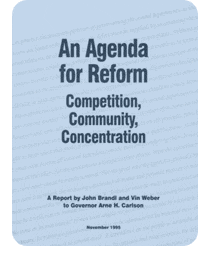Facing a bleak fiscal forecast in 1995, Governor Carlson asked John Brandl, University of Minnesota professor at the Humphrey School of Public Affairs, and Vin Weber, an independent consultant and former member of Congress, to identify ways to restructure services and avoid an $8 billion budget crisis.
In response, Brandl and Weber developed the "Agenda for Reform," urging that all services for people with developmental disabilities be "means tested" (or tested for income), and that funds should go directly to citizens, not bureaucracies.

The "Agenda for Reform" recommended that funds be appropriated directly to the citizens.
In 1993, Stephen Gold represented Helen L. in a Pennsylvania case, "Helen L. v. Desario." The Pennsylvania case challenged the state's referral system which previously focused on providing attendant care services in a nursing home environment rather than the preferred method of providing services directly in the community.
L. C. and E. W. from Georgia later filed a similar suit and Sue Jameson represented them. Referred to as the "Olmstead Decision," the landmark case was settled by the U.S. Supreme Court on June 22, 1999. The decision calls for states to provide services in the most integrated setting.

Stephen Gold






